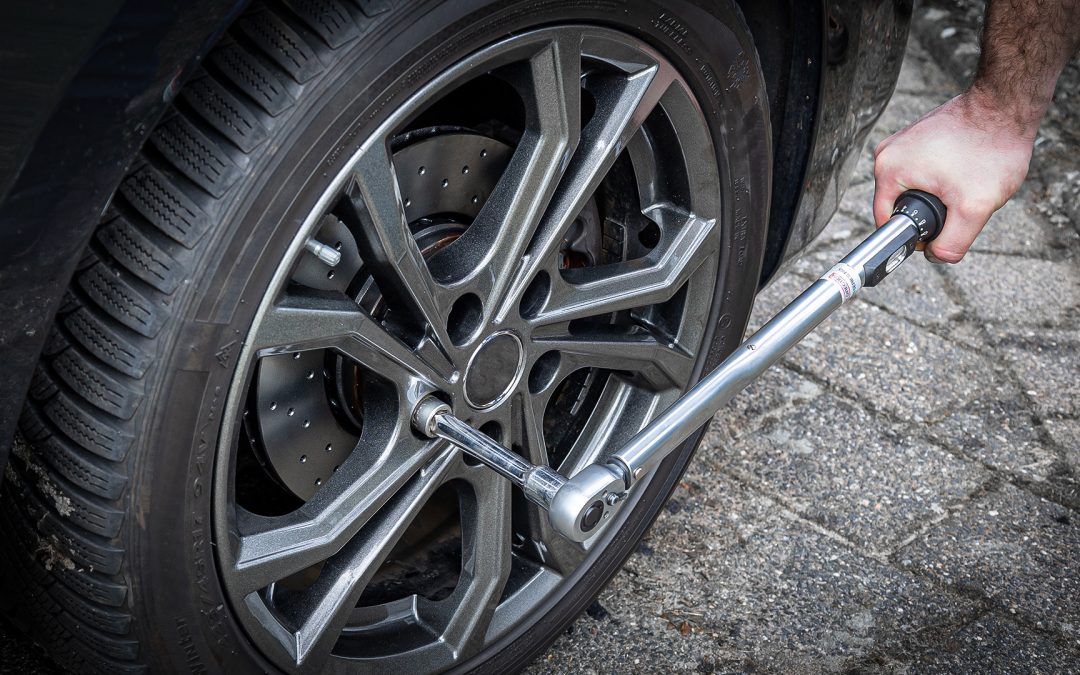If you’re still using torque sticks and impact power to install lug nuts and lug bolts, it’s time to reconsider.

In my line of work it helps if you like cars. It helps even more if you love ‘em. Which I do, and far more than they deserve to be loved as inanimate objects. That misplaced affection—along with the fact that I bore easily—also helps explain why I’ve had so many. Wayyyy too many, statistically speaking. My half-assed internet research indicates the average American male will own between 8 and 12 vehicles in his average 82-year lifespan. I’ve had 28. In car-years that makes me roughly 200 years old, which allows me a rare opportunity to say that I look pretty damned good for my age.
The biggest downside to falling in and out of love with my daily driver nearly as often as the Eagles crush the dreams of devoted Philadelphians is the cumulative steaming pile of negative trade-in equity the habit generates. But on the upside, I’ve been able to learn a very valuable lesson in more or less the same way technicians are taught it, albeit on a much more protracted timetable. And here it is:
The worst cars are the best teachers. And there’s no substitute for a great mechanic.
My first car was a 1973 Super Jeep, a CJ-5 model from the American Motors days. Behold the gaudy exterior and interior inexplicably bestowed on just 300 of these craptastic vehicles. Trust me—as garish as it looks 50 years later, that color scheme was nonetheless the highlight of this poorly built, underpowered, underequipped, unpredictable Wrangler-before-anyone-called-it-a-Wrangler. It was good for one thing and one thing only, and it was the feature that mattered most to this then-teenage boy: It looked cool and girls loved it.
That appeal only went so far though, literally. Date nights could only be at local destinations accessible by side roads, because at highway speeds, the Super Jeep interior sounded like a kitchen blender grinding gravel, making conversation impossible. Weekend mornings I would take the Jeep off-roading on local trails. Where stuff on it would break. All kinds of stuff. A lot.

When I bottomed out the Jeep in a ditch, I punched a hole in the radiator. I learned about re-cored replacements sold by a neighborhood radiator shop and replaced it myself, following the installation instructions from the sympathetic shop owner. When I drove too fast over rough terrain, the heavy rear spare tire mount flexed so much it busted the tailgate clean off the fenders. So I learned how to bend, build, and install makeshift steel brackets to pull the tailgate back into one piece. When I wanted to listen to something more interesting than my own teenage thoughts, I bought and installed a radio under the dash and an antenna on the hood, following the advice of a kindly counter guy at Pep Boys. And when I misjudged a rock and my muffler paid the price, I replaced it myself with a cool-sounding Thrush unit, while learning the hard way that you should never, ever, work on a rusty exhaust system without protective glasses.
I had a love/hate relationship with that first car. Loved it because it inspired a lifelong appreciation for complex machinery and an appreciation of the critical thinking skills needed to repair it. Hated it because off-road or on, it was as untrustworthy as a politician’s promise. But I learned from it, and from the skilled techs who were generous with their time and advice to a teenager who was short on funds.
My wife likes to joke that when I die, my gravestone should read “Here Lies My Loving Husband. Sometimes He Just Didn’t Think Things Through.” When it came to choosing my next classroom on wheels, I plead guilty as charged. Because there’s no other plausible explanation for buying a used 1974 Fiat 124 Spider convertible just like this one. Fiats were (and reportedly still are) legendarily unreliable. By then I was in college and presumably old enough to know better but that didn’t stop me, because, well, because the car looked cool and women loved to ride in it. When it ran. Which was, shall we say, intermittently.
The Spider was the Ragu jar of cars: appealing in appearance, appalling in actuality. That motorized disgrace to my Italian heritage (along with a patient independent mechanic near my college campus) taught me a lot about automotive electrical systems—a must, since every single fuse for the dashboard blew every time I yanked on the headlight control.

Photo: iStock.com/onfilm.
It also taught me that when you replace worn-out seats with ones you pulled yourself from a salvage yard sports car, you should pay attention to whether or not they were stored outside. You know, where it rains, turning the foam inserts in the seat covers into large, permanently soaked sponges? So your girlfriend doesn’t have to sit on a giant makeshift diaper made up of layers of Hefty Bags and old sheets?
My road to automotive repair knowledge was already paved with checks written to real service technicians who already knew everything that I plainly insisted on learning the hard way. Did that stop me? Of course not. I still had much to learn on my educational journey. Cars have lots of systems and even more parts, and I’d barely scratched the clearcoat of discovering what could break on them.
Regrettably, that void was filled to overflowing all too soon when I bought an SUV made by the brand that had and has the dubious global honor of being known as Most Likely to Have Everything Eventually Fail: Land Rover.
Let’s save ourselves the time and space here of explaining exactly why I spent my hard-earned money on an automotive brand so notoriously prone to leaving owners stranded that J.D. Power and Consumer Reports editors rub their collective ink-stained hands in glee every time a new model is announced. I’m assuming you’ve already detected a pattern of behavior here, but perhaps you need a hint.

I thought my old Fiat and my Scranton mechanic/automotive professor/psychotherapist had already taught me plenty about electrical systems. Nope. My new-to-me Land Rover Range Rover County Classic showed me a whole new level of fresh hell on Earth while forcing me to learn about the intricacies of corroded British alternators, irregular voltage regulators, and electrical connections that didn’t connect at all. I couldn’t work on any of it because (a.) Land Rover parts are tough to find and are priced to keep the U.K. from economic ruin, and (b.) I was frankly terrified of the unknown—have you SEEN the engine compartment of a Range Rover?
And by the way, you know that old joke about why “the Brits drink their beer warm?” It’s only funny if Lucas DIDN’T build your SUV’s electrics and you’re NOT on a first-name basis with your local independent Land Rover mechanic, a wealthy masochist whose vacation home in Boca is reasonable compensation for the daily frustration of wrenching on sad displays of Queen and Country’s automotive “engineering.”
My Rover also exposed me to the horrors of the brand’s early-generation air suspension system when I one day realized that my vehicle’s left rear sagged like it’d been stricken with Bell’s Palsy. Don’t even ask what it cost me to fix it because I don’t know. By then I’d had enough of Land Rover, as had my checking account, and when I dumped that sickly truck I believe my mechanic actually grieved like he’d lost a loved one.
With age, they say, comes wisdom and if you’ve worked hard enough, a little bit more money than you had in your youth. For the last 10 years or so I’ve been able to afford to drive newer cars. For the most part when they’ve needed service, I’ve benefited greatly from my expensive tuition at the School of Automotive Repair Hard Knocks. I no longer work on my personal vehicles, but I have a stronger than average understanding of how they work. Strong enough that when I detect a problem, I’m able to explain it to my service writer without resorting to making embarrassing noises simulating the weird sound coming from underneath my SUV.
Which makes me worry for the current and future generations. Unless a kid is in the market for a Yugo or a Lada, or—Lord help them—a Fiat, it’s hard to imagine learning much from modern cars and trucks. They’re just too damned good and more importantly, too damned complex. The mysterious shroud covering the engine compartment of my wife’s SUV hides an overwhelming digital/analog mash-up of modules and mechanicals. Troubleshooting, much less repairing anything underneath it would take more courage, better tools, and tinier hands than I possess. It would be easier for me to diagnose whether I’ve gotten COVID a second time than it is for me to figure out why the 8-speed automatic transmission is skipping…and a lot less fun.
So, to all the skilled technicians that helped save me from myself during those formative early years…thank you. Oh, and if you’re a youngster who absolutely, positively must have a sexy Italian convertible, godspeed—and hit me up here at Shop Press for the telephone number of a great mechanic in Scranton, Pennsylvania. You’re gonna need him.
The articles and other content contained on this site may contain links to third party websites. By clicking them, you consent to Dorman’s Website Use Agreement.
Participation in this forum is subject to Dorman’s Website Terms & Conditions. Please read our Comment Policy before commenting.